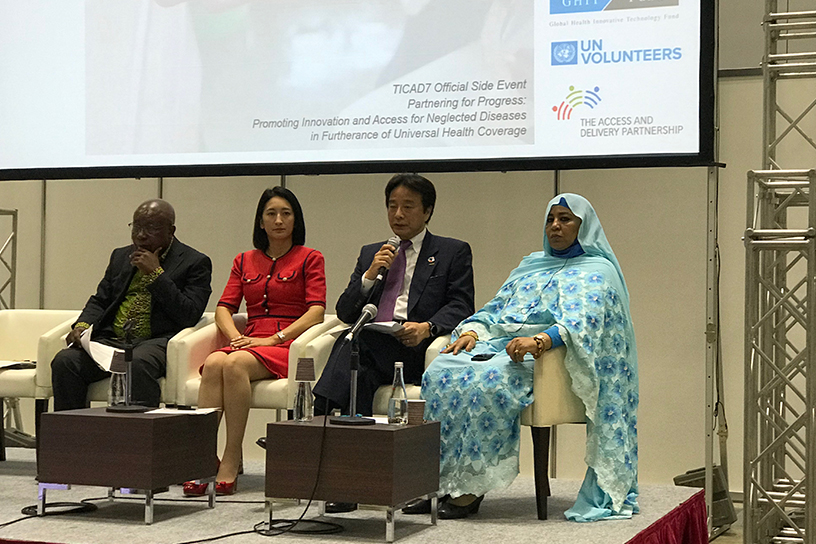The Fujifilm Group developed an AI technology that can be applied to a wide range of services, including diagnostic imaging systems, medical workflow streamlining, and medical device maintenance. In April 2018, the Fujifilm Group announced development of such widely applicable AI technologies under the brand name of REiLI.
The Fujifilm Group’s efforts to develop AI technology has stimulated responses and support from many medical professionals, and as a result, we are receiving more requests to provide lectures on AI technology at academic and research conferences. Our other initiatives include a successful development of AI-based diagnostic technology for interstitial pneumonia, achieved jointly with Kyoto University. A joint research project with Osaka University and Indiana University School of Medicine has also commenced. We have set up the Artificial Intelligence Diagnostic Imaging Joint Research Chair within Osaka University’s Graduate School of Medicine to develop practical applications for advanced AI technologies. We also took a part as a private company in Global Alliance Under the Dynamic Innovation (GAUDI), an open innovation program started in July 2019 by Juntendo University to accelerate the commercialization of new medical technologies. Based on the clinical data obtained through the university’s hospital, which has one of the largest numbers of beds and patients in Japan, we plan to develop comprehensive medical AI technologies in close collaboration with doctors and medical staff. In July 2019, we launched the SYNAPSE SAI viewer under the brand name of REiLI. The SYNAPSE SAI viewer is an AI platform that supports diagnostic imaging workflows by extracting images of a specific organ from a CT scan or by displaying chronological changes in bone structure. We plan to accelerate the implementation of AI solutions which allows doctors to concentrate on diagnosis by streamlining their workflow and maximizing their time dedicated on their core task of appropriate and right diagnosis of patients. The solutions were jointly created with academia around the world.
Achieving Universal Health Coverage (UHC)*1 especially in emerging countries in Africa and Asia is a global goal outlined as one of the targets in the SDG Goal 3. Japan is a model UHC country because of its universal health insurance system. Utilizing the know-how developed in Japan, the Fujifilm Group has been supporting the development of medical technology, human resource development and dissemination of regular medical checkup practice in emerging countries.
In FY2018, we continued with the medical collaboration project for the use of remote diagnostic imaging technology in Brazil that was adopted by JICA in FY2017. Our efforts this year included holding the first Mammography Training Seminar in South Africa, and endoscopy workshops in Myanmar and Kirghiz. We are keen to provide technical instructions and training sessions to doctors and technicians in emerging countries. Together with FIND, since 2016 we have also been developing TB-LAM, a highly sensitive rapid tuberculosis diagnostic kit to detect tuberculosis among people living with HIV using urine specimens. As a preparation to obtain WHO recommendation, TB-LAM has acquired IVD98/79/ EC (In-Vitro Diagnostic Medical Device Directive) in December 2018 and we have began supplying TBLAM kits to research institutions around the globe for clinical evaluation purposes.
The 7th Tokyo International Conference on African Development (TICAD7) was held in Yokohama in August 2019, and the Fujifilm Group presented our medical work in Africa at the conference. We contributed to the success of TICAD7 in an unique Fujifilm way by holding a TICAD memorial photo exhibition in FUJIFILM SQUARE and participated in an official side event.
- *1 Universal Health Coverage: The condition in which all people can receive appropriate health care services, such as disease prevention, treatment, and rehabilitation at a reasonable cost.

The exhibition booth displayed our recent efforts with JICA to reduce maternal mortality by using an ultrasound imaging system (left, Kenya), as well as introducing the diagnostic performance of a highly sensitive point-of-care tuberculosis diagnostic kit TB-LAM (right).

Displayed healthcare products for tuberculosis and breast cancer, which are major issues in Africa.

Participated as a panelist at the official side event, “Partnering for Progress: Promoting Innovation & Access for Neglected Diseases in Furtherance of UHC.”

Held a memorial photo exhibition “Africa—Heartbeat of the Continent” in FUJIFILM SQUARE (hosted by the World Bank Group). The photo taken at the opening reception.